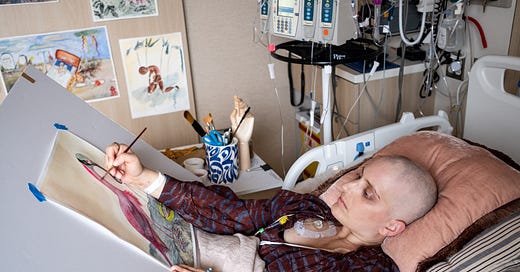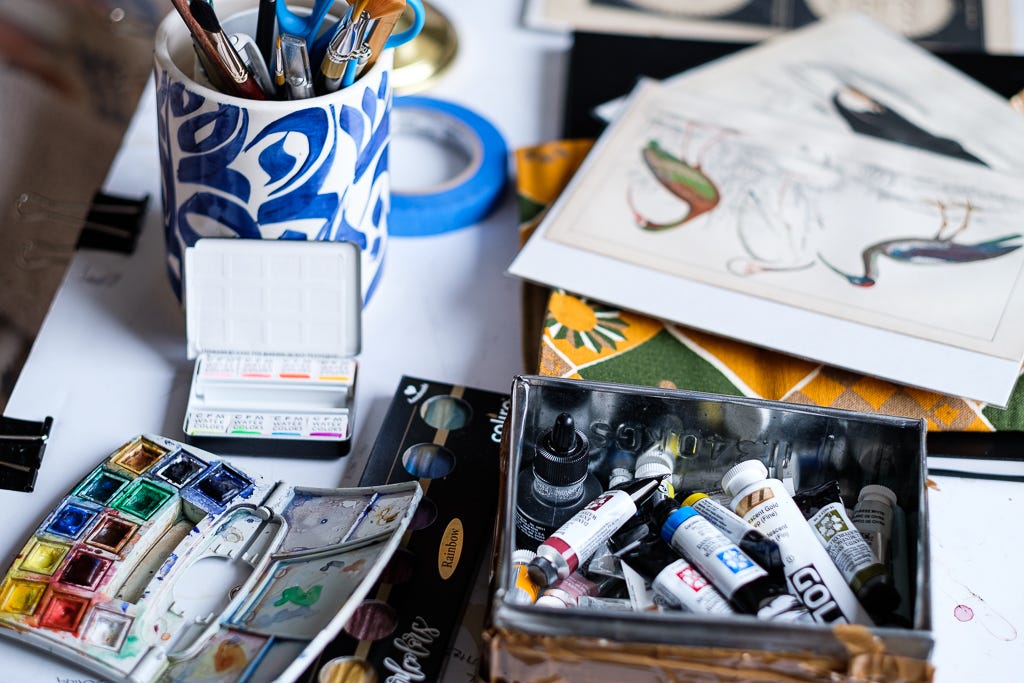Hi friend,
I’ve never been one to do things halfway. Especially when embarking on a new creative project, I throw myself in full force, no holds barred, jumping right into the deep end. When I was writing Between Two Kingdoms, it felt as much a physical challenge as a mental one, and I told my partner Jon that I needed to take care of my body as much as my mind—that I needed to approach it almost like a professional athlete would. I ate well and went to sleep early and even started running for the first (and last) time in my life. If I was going to write the book I hoped to, I needed to be in peak shape.
When I think about that experience, and really any creative endeavor I’ve embarked upon, from playing the double bass to this new experiment with watercolors, the word that comes up for me is discipline. A fraught concept, I know, overlaid with so many connotations, not all of them positive or pleasant. But I also think of discipline as an exciting, appealing, enlivening promise, in that it’s a commitment to change. In the case of our upcoming 100-day project—which begins this Friday, April 1, and is free for all to join—it’s a small, incremental change of incorporating one creative act into your day.
What discipline looks like in this context is deeply personal, varying widely from one to the next. For me, the discipline needed to see it through boils down to three things: routine, accountability, and contingencies. I’m struggling with side effects of my transplant, and I know that establishing a routine will be difficult, since my health is unpredictable and I’m still spending most days at the hospital. So on days I’m home, I’m committing to paint for 30 minutes right when I get up; on hospital days, I’ll do it right when I wake up from my afternoon nap. For the accountability piece, I’m making a 100-day calendar, so I can cross off each day, as well as doing regular check-ins with my mom and my friend Carmen, who are joining me in their own creative projects. And my contingency plan is to lower the bar: for example, on days when I’m feeling really sick, rather than expecting myself to make marked progress on a painting, I’ll paint one small, simple thing and call it a day—a flower, a palm frond, or a pillowy cloud.
The gentleness of that contingency is a necessary grace. Our days are busy, our lives are unpredictable, and our energy and focus are constantly in flux. Consistency is the hardest part of any sustained practice, and there will be moments where you’re tempted to skip a day or even give up.
Today I have a prompt to help you tend to those potential creative low points. Whether you’re embarking on the 100-day project with me or building something that’s all your own, may this help you commit to seeing it through.
Sending love,
Suleika
P.S. If you’ve come up with your 100-day project, I’m dying to know what it is. Tell us about it in the comments!
P.P.S. This 100-day project will be self-directed, but for those who want an extra dose of accountability, paid subscribers will have the option of getting regular check-ins and pep talks from me, along with opportunities to have their work featured. Paid subscriptions are $6 a month or $60 a year. If you want to take part but a paid subscription feels out of reach, just email me. No questions asked.
The Isolation Journals is my newsletter for people seeking to transform life's interruptions into creative grist. Both free and paid subscriptions are available. The best way to support my work is with a paid subscription, where you get added benefits like access to my advice column Dear Susu, an archive of interviews with amazing artists, behind-the-scenes tidbits from me, our virtual writing hour the Hatch, and other opportunities for creative community.
Prompt 188. The Creative Contract by Suleika Jaouad
When it comes to a creative practice, we all have our own particular blocks—those shadow tendencies that emerge and prevent us from plowing forward. For some, it’s external obligations and distractions, for others the internal voice that says, “You’re not good enough.” For all of us, these dang smartphones, forever within arm’s reach, forever full of time-obliterating distractions!
Famous artists of all kinds have faced creative blocks. There’s Georgia O’Keefe, fearing failure and preoccupied by troubles in her marriage, struggling to make progress on a mural at Radio City Music Hall. There’s Ludwig von Beethoven in a seven-year fallow period that historians attribute to illness, frustration with his loss of hearing, and legal woes. There’s Ralph Ellison, who after publishing The Invisible Man spent more than four decades writing and rewriting his second novel, which he hoped would champion a Black aesthetic and rival Moby Dick. It was a tall order, and it saddled him with what he called “writer’s block as big as the Ritz.”
These examples resonate with me, as my own creative blocks sprout from similar seeds. I’ll procrastinate—my kitchen is never cleaner than when I’m on deadline—putting off my hardest task until the afternoon, even though I know the limitations of my body and my energy levels, and with each passing hour, it’s diminishing returns. Or I go back and reread what I’ve written and immediately start self-flagellating and self-criticizing, to the point that I can’t move forward. Then there’s the biggest hurdle I create for myself: being unrealistic with my expectations. I’ll set an overly ambitious goal, one that’s unsustainable and becomes exhausting, something I dread. Suddenly, it’s taking everything out of me to keep doing it, but I don’t want to go back on the commitment I’ve made. I feel trapped.
Over time, I have learned to anticipate these pitfalls—to confront them, to interrogate them, to tend to them. I’ve come up with mechanisms and solutions for when my creative low point arrives—because inevitably it will. For my first 100-day project, I had three firm rules:
Write every day, first thing in the morning.
Write any amount (even just one word).
Don’t re-read what you wrote or show it to anyone else.
Recently, I’ve been focusing on watercolors, and it’s been a little different. What keeps me coming back is a new trick I’ve devised: I call it a day when I have a clear sense of what I want to do next, or when I’m excited about painting a particular detail—the wing of a bird, or a lemon tree, or a beautiful tropical leaf. It makes me look forward to returning to the canvas. I think of it as a gift for tomorrow’s self. I’ve also been thinking about what I want to feel after I’ve finished painting for the day, and making that my goal, rather than fixating on output. I want to feel joyous and playful, even a little feral, and liberated.
So with all that in mind, I’m drafting a creative contract for myself as I enter into a new 100-day project. So far, this is what I’ve got:
I will paint every day, no matter how much or how long.
I will leave a gift on the canvas for tomorrow’s self.
My goals are wildness, playfulness, and liberation.
Your prompt for the week:
Make a creative contract with yourself:
List your blocks—like consistency, crushing expectations, self-discipline, or self-doubt. Name them, interrogate them, and make a plan to tend to them.
List the things that will keep you coming back: A low bar to entry? An accountability buddy? A set routine?
Rather than setting a goal, set a mood intention for how you want to feel while in the creative process.
Consider adding a pep talk for when you find yourself at a creative low point.
When you’re done, sign your contract—or laminate it, get it notarized, hang it above your desk. Whatever it takes to make it stick!
If you’d like, you can post your response in the comments below, in our Facebook group, or on Instagram by tagging @theisolationjournals.
For more paid subscriber benefits, see—
Dear Susu #1, Read Me, See Me, Like Me, on what to do with our words
Our Studio Visit with Elizabeth Gilbert, on creating beyond fear
Notes from February’s meeting of the Hatch, Carmen Radley on conjuring worlds with writing






My 100 day project has two parts--listening to the audiobook of Virginia Woolf’s The Waves for 5 minutes. Then I will use something with in it--a phrase, an image, an idea, an atmosphere--as a springboard to write for at least ten minutes.
I’m sitting in that purgatorial space between kingdoms, one month post autologous stem cell transplant for multiple myeloma. Leading up to and during my time in hospital, I blogged like my life depended on it, and now it’s come to a screeching halt. So! My 100 day project will be to pick up from where I left off, focusing on sharing perhaps useful information for others preparing for SCT. I include photos and personal stories so that will continue as well as the daily beach walks that feed my creative soul and give me space to grieve. To this community and Suleika, thank you for so generously sharing your stories. - Amy J.